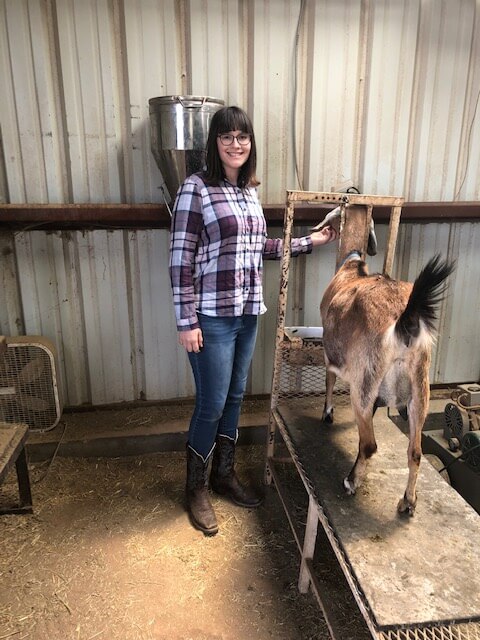
By Michelle Glicksman
For Madelyn Varela, one of her earliest memories formed on her very first day of preschool.
“We had to draw what we wanted to do when we grew up, and one of the choices was a farmer,” she recalls.
It was a memory that, as a now 18-year-old, would prove to be fortuitous.
As she got older, Varela continued to be drawn to farming.
“I went back-and-forth with veterinary and other things, but always seemed to come back to farming and animal husbandry,” she says.
Fast-forward to when Varela was 16, turning 17, and she landed her first internship, working at The Simple Farm in Scottsdale.
That’s where she found that she loved working with goats.
Raising Goats
“Once I started actually working with the goats, I really loved them and their personalities,” she says. “They’re actually very similar to dogs.”
Goats are playful and have their own personalities, and tend to bond with humans as well. They’re also easy to raise, Varela says, and require less room per animal, less feed, and less water.
Varela’s internship at The Simple Farm coincided with her graduation from high school (she was homeschooled), and so it was easy for her to take on her next internship, which is a more in-depth role.
She recently moved to Pearce, Ariz., to intern at Stand Alone Ranch. Her role involves living on property and taking care of all the animals.
“I do all the goat care,” she says. “I get up at 5:30 a.m. and give them their breakfast and water, and then feed them again around 5:30 or 6 p.m. That’s also when I do the milking.”
There are 65-75 quality purebred Nubian milking goats at the Stand Alone Ranch, although only 10 are currently in production. The ranch has a milking machine, so that actual milking itself takes about 30 minutes. Hand-milking would take about three hours.
There are also 150 chickens, a few Muscovy ducks, cattle, horses, and dogs and cats.
Stand Alone Ranch is working towards becoming a micro-dairy, and also offers its Udderly Natural Products, which are artisanal hand crafted goats milk soaps, lotions and more.
Dreams of Her Own Goat Farm
If all goes well with this year, Varela hopes to stay on for one additional year of interning, since to qualify for USDA loans and grants, three years of farming internships are required. As well, as a grade B dairy they would make cheese, which she says she would love to learn how to do and be a part of.
Qualifying for USDA loans and grants would help Varela achieve her long-term dream, which is to start her own farm and raise goats.
“Obviously, I would like to start out small,” she says. “I would like to focus more food-wise, such as cheese, caramel and fudge. I would scale as the demand grows. I’d maybe start out with 25-30 goats, and go from there.”
She would also like to open the farm to the public on select days, as well as have a small store where she would sell products.
“I think it’s important for people to see where their food comes from—to see the animals where their food is coming from, and to see they are being treated well,” she says.
Varela has always been drawn to Prescott, and since she would like to move someplace cooler, may locate her farm there.
Though it would be a dream come true, she admits there is one thing that isn’t her favorite—“Getting up at 5:30 a.m. to feed them!”
Going in Her Own Direction
When Varela’s dreams come true, she will have the distinction of being the first in her family to venture into this type of work. Her mom, sister, grandfather and nana live in Fountain Hills, and her mom’s side is in construction. On her dad’s side, there are lot of family members who are in teaching or sales.
“My mom’s side is very into [me being a farmer] and they think it’s cool,” she says. “…They just really get it and like it. My dad’s side don’t really understand it, but they support it. My grandpa it took a while for him to accept it, but he’s come around. I send him pictures every day of the baby goats and he likes it now. It’s different than anything in my family. But, I’ve done a lot of research thinking that this is what I want to do.”
Michelle Glicksman is the editor-in-chief of Green Living Magazine. She is a prolific writer and editor, and enjoys spending time with her family and friends, as well as traveling. Find her on Instagram at @michelleglicksman.







Love it! Keep healthy living with nature alive!
Misty La Salvia